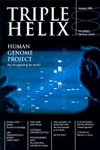The birth of Siamese twins has always been a topic of popular fascination. In a previous age such births were usually interpreted as a supernatural event. They were variously seen as signs of blessing or warning, a portent for the future, or a judgment of past wrongs. In our enlightened times, the human interest is seen in the headline news, the feature articles, and in the unusual sight of Appeal Court judges agonising in public. The media coverage illustrates a strange combination of fascination, revulsion and sympathy for the family trapped in this extraordinary drama.
So, does biblical Christianity have anything distinctive to say about this case? Firstly, a Christian response must emphasise the human tragedy of the twins and their parents. These are not freak show exhibits, nor are they merely the raw materials, for complex, legal, philosophical and theological disputes. No, they are human beings, made out of the same flesh and blood as the rest of us, beings to whom we owe a duty of love, respect and protection, flawed masterpieces whose flaws are simply more dramatic than usual. Above all they are tragic lives - destined, almost inevitably, to die within weeks or months. So as Christians we must firstly be concerned to protect the dignity, privacy and grief of the family.
Secondly, the Christian perspective encompasses a strange ambiguity towards medical technology. On the one hand we embrace and celebrate the life-sustaining potential that complex reconstructive surgery can offer. At the same time we recognise that this kind of surgery can be harmful and even abhorrent in its destructive capacity. In Christianity death is not the ultimate tragedy. To decapitate and dismember a living child in the name of medicine may be a worse outcome than ensuring that both children have appropriate palliative and symptomatic care. For the Appeal Court to force this surgical disaster on the twins against their parents' wishes seems unconscionable. In Christian thought death, although always a tragedy, may in certain circumstances be a severe mercy and even a strange kind of healing. Paradoxically, it is our very respect for human life which may lead us to say no to the possibility of technology medicine.































